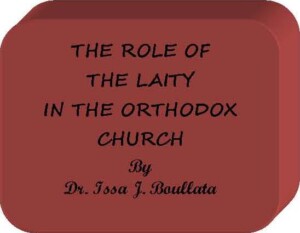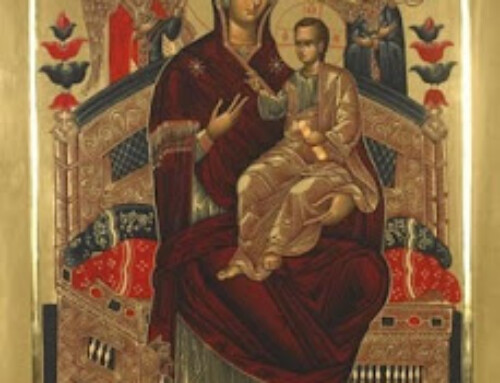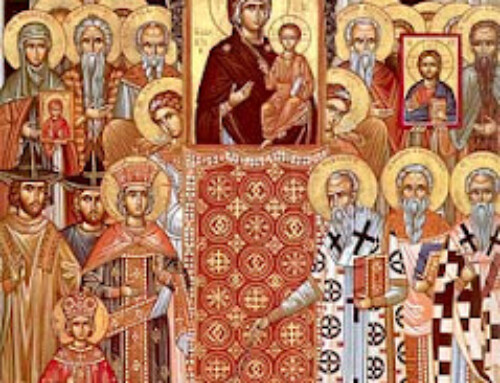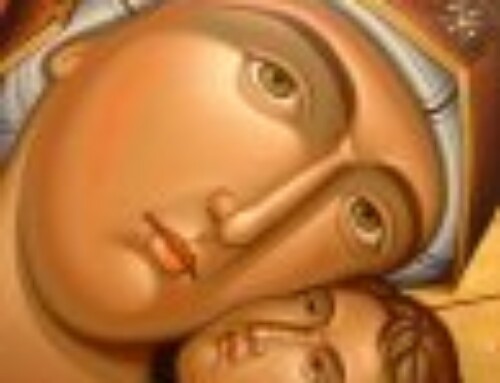The word church in English is akin to German Kirche and Scottish kirk, derived ultimately from Greek kyriakos, relating to kyrios, which means “lord” or “master,” and thus the Church is an institution relating to the Lord; the equivalent word in French is église, which is derived from Latin ecclesia, from Greek ekklesia which means assembly, and thus the Church is an assembly of people. Moving from Indo-European to Semitic languages, we note that the equivalent word in Arabic is kanisa, akin to Aramaic/Syriac knushto and Hebrew knéset, and it similarly means assembly. In Christian doctrine, the Church is the assembly of all the people who believe in Jesus Christ as Lord and Savior: clergy and laity; men and women; young and old; rich and poor; whatever their language, color, or ethnic origin; whatever their rank in society or their station in life. St. Paul says, “there is neither Jew nor Greek, there is neither slave nor free, there is neither male nor female; for you are all one in Christ Jesus” (Galatians 3:28).
Everyone is called forth or summoned to join the Church and to believe in Jesus Christ as Lord and Savior. In fact, the Greek noun ekklesia is derived from the Greek verb ekkalein, which means to call forth or to summon; and the Arabic noun kanisa is derived from the Arabic verb kanasa, which means to assemble. However, although everyone is called to join the Church and assemble in the name of Jesus Christ, not everyone leads the Church. Jesus Christ as founder and head of the Church chose only twelve apostles as leaders, and they in turn chose others as the need arose; in later generations others still were chosen in apostolic succession by the laying on of hands — and continue to be so chosen to this day: by the divine grace of the Holy Spirit they are ordained as deacons and priests, and consecrated as bishops.
The clergy of the Church are chosen to lead the believers, but they do not constitute the Church. They are an important part of the Church but they are not the whole Church; the other important part of the Church are the laity. Without the laity, there is no Church; and without the clergy there is no Church either. Both laity and clergy are needed to constitute the Church; they are both needed to form the assembly of the people who believe in Jesus Christ as Lord and Savior; they are both needed to build up the body of Christ. St. Paul says, “And his gifts were that some should be apostles, some prophets, some evangelists, some pastors and teachers, for the equipment [the preparation] of the saints, for the work of ministry, for building up the body of Christ” (Ephesians 4:11-12).They are all needed to constitute what is referred to in the Nicene Creed as the “one, holy, catholic, and apostolic Church.” The Church is one because its head is one, and so is its one faith in one God (Ephesians 4:4-6). The Church is holy because it has been sanctified and justified in the name of Jesus Christ and in the Spirit of God (I Corinthians 6:11). The Church is catholic because it is universal and open to all the people of the world (Galatians 3:28). And it is apostolic because it has preserved the teachings of the apostles and has been built upon the foundation of the apostles and the prophets, whose cornerstone is Jesus Christ (Ephesians 2:20).The role of the clergy in the Church is to preach the Gospel of Jesus Christ, to strengthen faith in the hearts of the people in the community, and to confirm them in righteousness and saintliness. Their role is to guide the religious community, defend its faith against detractors, and lead those who go astray back to the Truth. Their role is to preserve the teachings of Jesus Christ, maintain the apostolic tradition, and perpetuate the faith until the second coming of Jesus Christ. Their role is to minister to the spiritual needs of the community through regular prayer and through the sacraments and, inasmuch as spiritual needs are related to bodily needs, their role also is to care for the social wellbeing of their community and its unity and prosperity. All these are momentous duties of the clergy and have consequential results in the world. They are not the main topic of this [discussion], but they are strongly bound to the main topic, which is the role of the laity in the Church.
The role of the laity in the Church may be viewed from two complementary angles. On the one hand their role is related to matters of the Spirit; and on the other, it is related to matters of the Body. These should not be seen as two independent categories, because matters of the Spirit are connected with matters of the Body. And insofar as the Spirit of God is connected with the Body of Christ, spiritual matters of the laity are related to their body as a community of believers. I will now deal with the role of the laity, hoping that it will be remembered that both their spiritual and their community affairs are related.
Of course, the first role of the laity is to keep the faith, maintain the beliefs of the Church, sustain its traditions, observe its practices and rituals, and in every perfect manner persist in a spiritual life pleasing to the Lord in accordance with the teachings of Jesus Christ and the Apostles. Furthermore, the role of the laity requires that its members support one another as one body of believers; they should help one another, give guidance and advice to one another; and in every good way, they should act as members of one body feeling the pain of the other members, rejoicing in their joy, and expressing full solidarity with one another in words and in deeds.
In order to perform their role in the best manner, the laity need to organize themselves in groups with specific functions, depending on the necessities of the society in which they live. They may establish and run Sunday schools and Bible study groups; they may organize and operate educational institutions, colleges, and schools for the younger members of their community and for others; they may form charitable associations to care for the poor and the homeless, to feed the hungry, to clothe the naked, to visit the lonely, the sick, the suffering, and the prisoners, to minister to the aged and the handicapped, and to look after the health and social needs of their community and others; they may found social clubs to create venues for their members to meet one another, and places to find social entertainment, cultural betterment, athletic and youth activities — all in an ethical atmosphere acceptable to the Church; they may start publications such as church magazines, newsletters, or journals to discuss community problems, to highlight public issues of concern to their members, and to foster the good of the community and give it a sense of unity and purpose.
In short, the laity’s role is to watch for the well-being of the Church as an assembly of people who believe in Jesus Christ as Lord and Savior. This role includes the duty to see that the Church is well served by the clergy. This duty is a great responsibility because the clergy need theological education prior to ordination, they need to be financially supported after ordination and enabled to represent the Church with dignity, they need to be replaced when their numbers decline by retirement and death. And the laity should provide for these contingencies by financial gifts and donations, by regular pledges and tithes, or by whatever means are established by the tradition of their region.
This is why it is important that the laity participate in the administration of the Church and help their bishop in his regional responsibilities and their priest in his local obligations. The laity should organize themselves in regional councils to help their bishop, and in local councils to help their priest; they should not involve themselves in theological and religious matters best left to the clergy to deal with, but they should help the clergy in the administrative and financial conduct of Church affairs.
When a member of the laity is chosen from the people to be ordained by the bishop, the role of the laity is to be consulted and to consider him seriously before they give their approval by acclaiming him to be axios (worthy, mustahiqq). And when a priest is chosen from the clergy to be consecrated as bishop by three hierarchs, the role of the laity is even more momentous and solemn before they acclaim him to be axios. The election of a patriarch, in the historical sees traditionally held by patriarchs in the Eastern Orthodox Church, is even much more momentous and serious. And there have been cases in history when the laity withheld their approval. For example, when Patriarch Damianos, the Patriarch of Jerusalem, died in 1931 after having ruled for thirty-four years from 1897, the Arab Orthodox laity of Palestine and Transjordan refused to recognize any successor to him until their pending demands for reform were met. They obtained an injunction from the Supreme Court of Jerusalem to postpone the election of a new patriarch. However, in 1935 the British Mandatory Government of Palestine issued a new law (Law #29 for 1935) permitting the election, and Patriarch Timotheos was elected on 22 July 1935 without lay participation, an event which led the Arab Orthodox laity to object. They called for the nullification of the election and they locked their major churches so that the Patriarch could not perform his usual annual visits to them on the feast of each church’s patron saint, such as Mar Ya qub in Jerusalem and Mar Jiryis in Lydda, and they shunned Mar Mikha’il in Jaffa; furthermore, they boycotted the 1935 celebration of Christmas by the Patriarch in Bethlehem. The British Government of Palestine delayed issuing a decree of credentials recognizing the new patriarch and formed a committee representing the Arab Orthodox laity in Palestine and Transjordan as well as the Greek hierarchy to discuss the problem. However, the troubled political conditions of Palestine during the 1936-1939 Rebellion, followed by the Second World War 1939-1946, turned attention temporarily away from the problem, and the British Government quietly recognized the election of Patriarch Timotheos in 1939 for political reasons, after Greece had joined the Allies in the Second World War. But the British Government also issued a new law in 1941 containing many of the recommendations of the Bertram-Young Report of 1926, permitting the formation of a Mixed Council headed by the Patriarch and consisting of seven members of the clergy appointed by his Holy Synod, in addition to ten elected Arab Orthodox lay members, of whom seven would represent the Arab Orthodox laity of Palestine and three would represent those of Transjordan. The 1941 law was published in The Official Gazette but was never implemented.
The Arab Orthodox laity of Palestine and Jordan have continued until this day to object to the unlawful and irresponsible acts of the Orthodox Patriarch of Jerusalem, which have recently been even more serious, especially by the unjustified and unaccountable sale of Church property in Palestine, where every foot of land is a sacred Arab national trust to be treasured and preserved for all generations to come. This is not the time or place to discuss these matters, but I mention them as examples to show the role of the laity in the Church.
In sum, the laity should be alert to the well-being of their Church. If Church leaders stray, the role of the laity is to criticize those leaders and call for redress. They should voice their opposition to such misguided Church leaders nationally and internationally, in local Church councils and in ecumenical Church circles, in political quarters and in human rights gatherings. When doing so, they are only following the example of Jesus Christ, who rose against the misguided Jewish leaders of the Temple in Jerusalem, against the chief priests, the scribes, and Pharisees, the Sadducees and all the Jewish religious establishment and those who cooperated with it. Jesus Christ taught the people, saying, “Is it not written, ‘My house shall be called a house of prayer for all the nations’? But you have made it a den of robbers” (Mark 11:17).The Church should continue to be a house of prayer for all the nations, an assembly of all those who believe in Jesus Christ as Lord and Savior. The role of the laity is paramount in achieving this purpose and their responsibility is indeed grave. The Church is not a democracy, in the common sense of the word, but it is more than a democracy because it is a communion of souls. It requires a deeper involvement of its members in its well-being. If in political democracy the people should remain alert to the acts of their leaders, in the spiritual communion of the Church the people should be even more alert to the acts of their leaders because, by being so, they are alert to the Truth who is Jesus Christ Himself.
Issa J. Boullata, Ph.D. is chairman of the Montreal Chapter of the Task Force to Support Orthodox Christians in the Patriarchate of Jerusalem. He presented this paper to the Fifth Annual Conference of the Task Force in Arlington, VA in May, 1999.





